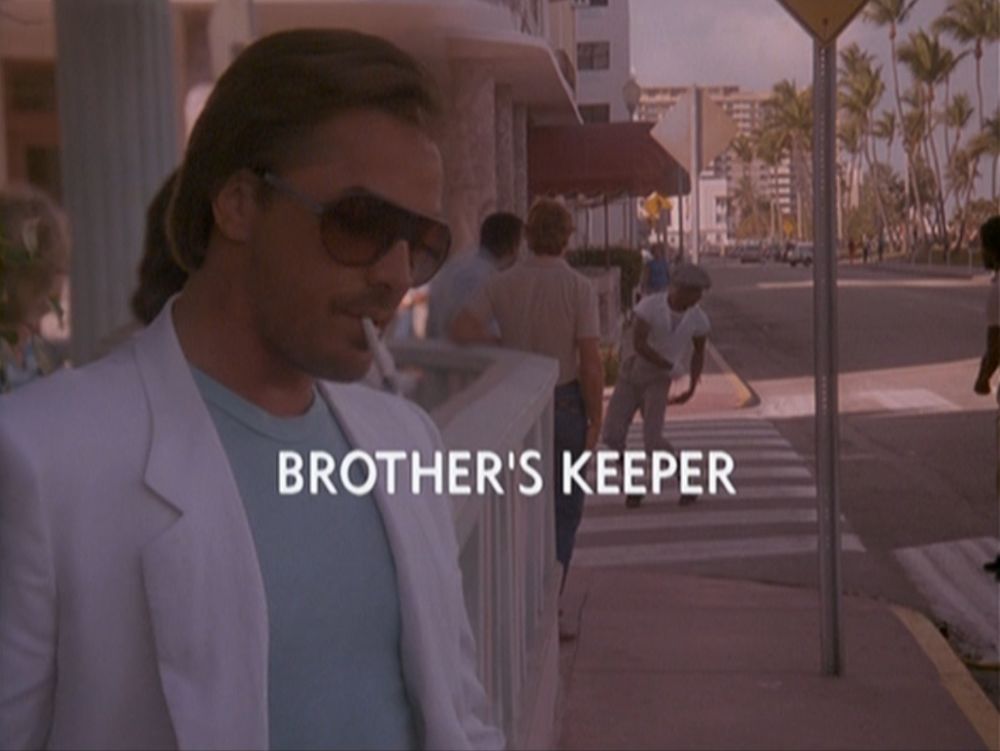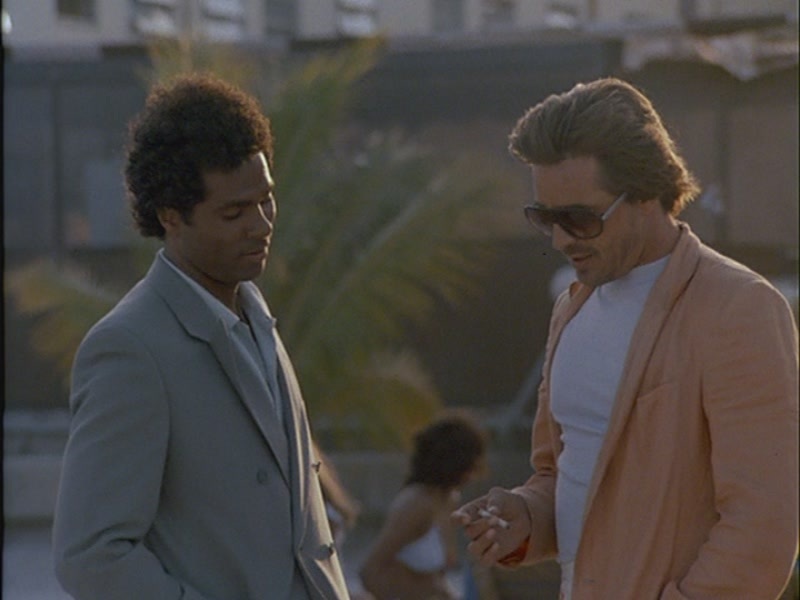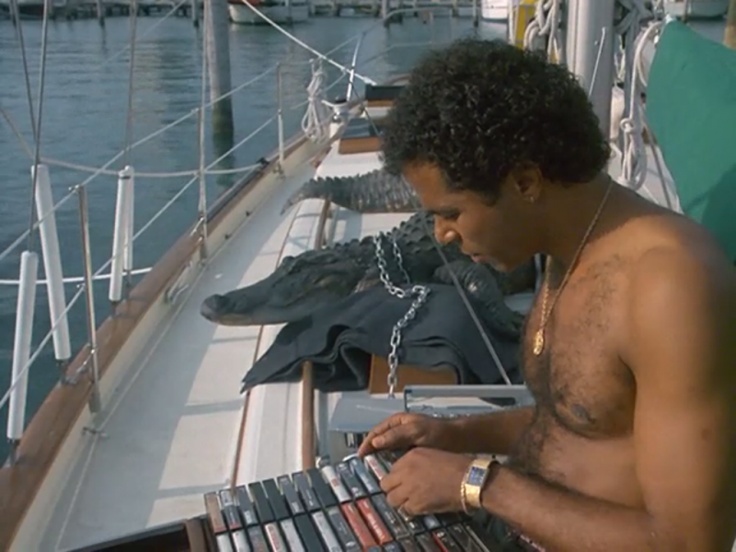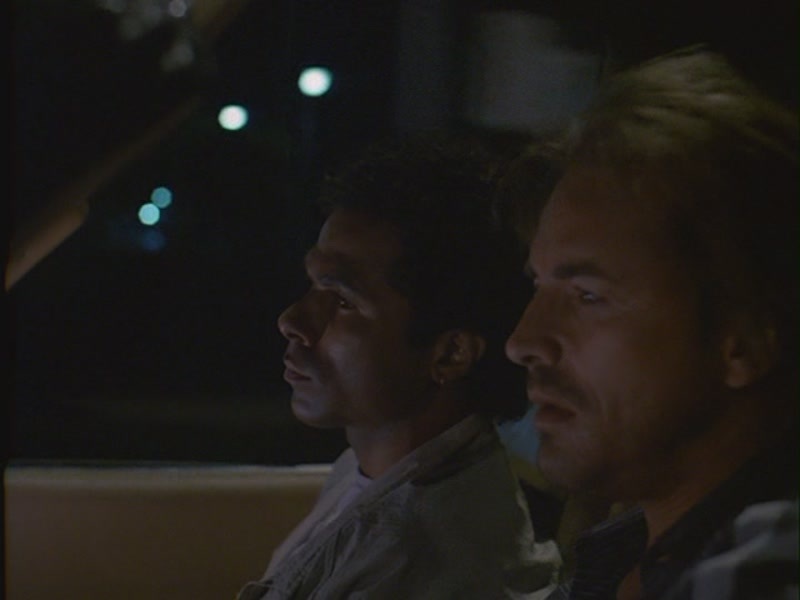For five seasons, Metro-Dade vice squad detectives Sonny Crockett and Rico Tubbs cruised the neon-soaked streets of Miami as soldiers in a seemingly endless war on drugs, guns and prostitution. For Deadshirt, writers Max Robinson and Jake Arant hit the pavement and dig into the very best episodes of Miami Vice.
“Brother’s Keeper” Part I and II
Directed by Thomas Carter
Written by Anthony Yerkovich
Max: Hello and welcome to the inaugural installment of The Virtues of Miami Vice, our bi-monthly look at the hot hot heat that is NBC’s Miami Vice. This week we’re starting off with the two part, movie length pilot. I’ve got to say, opening your TV show with The Rolling Stones’ “Miss You” is a supreme power move.
Jake: Miami Vice’s use of music is something that has yet to be topped by another TV show. Pulling hits from the top of the charts and syncing them to what’s happening onscreen is something that works brilliantly here, and the slick lighting and camera work makes it feel natural as opposed to forced. They absolutely knew what they were doing tonally from Episode One, which is pretty impressive.
Max: There’s a kind of uneasiness with tone in this pilot (which we’ll get into later) but you really see the strengths that’ll come to define the show right from the start: Cool camera work, dynamic editing and a killer soundtrack. “Brother’s Keeper” starts off with Philip Michael Thomas’ Tubbs blowing an attempted bust in New York before shifting to Miami, where Crockett (Don Johnson) watches his partner die thanks to a car bomb in a minor dealer’s car. There’s some really fantastic texture in these scenes, I loved the doomed drug dealer rambling on about the third world child he donates money to while obviously high out of his gourd, or Tubbs pulling a shotgun on that street gang.
Jake: The imagery of this show is fascinating. Crockett’s perfect white suit jackets against his stubble and bent Lucky Strikes is the perfect clean/dirty juxtaposition. The entire thing is so pretty, and yet runs on top of an undercurrent of dread and anxiety. Crockett and Tubbs don’t “feel” like the kind of TV cops we’re used to. They’re aggressive and flashy. Crockett especially is hot-tempered and prone to bouts of depression, and that vulnerability is what sells him, a man with a failed marriage and a dead partner.
Max: Crockett and Tubbs’ starting out as adversaries then uneasy allies then friends who fill the void of the friend/brother the other has lost is a totally straightforward Buddy Cop movie angle and it works pretty beautifully. Crockett feels pretty fully formed by the end of this episode but Tubbs felt a little all over the place for me. The show seems to want him to be kind of a “quirky” master of disguise (the different accents/identities, the catcalling, etc) but I dunno if it totally jibes with his angsty mission of revenge against (recurring villain) Calderone.
Jake: I agree here. Tubbs’ accents and characters are things that worked well with his more light-hearted characterization after he avenges his brother, but it’s whiplash-y when you see him go from brooding to doing what feels like a bit. His motivation is weaker than Crockett’s from an exposition standpoint, too. The pilot sets strands for Crockett that persist throughout the entire series (his failed marriage/strained relationship with his son, his grey view of the world) whereas Tubbs’ dead brother is essentially Chuck Cunningham’d out of existence once the pilot is over. Tubbs, in fact, is often played as the more level-headed of the two, despite everything he does throughout this episode being a dangerous, impulsive con-game.
Max: I love that Crockett and Tubbs are established here as being very much on the razor’s edge of going over the line as cops: Tubbs poses as his dead brother and lies his way into a case totally outside his jurisdiction, Crockett pretty much forges a search warrant to get into a bad guy’s apartment. Miami Vice is at its best when it leans into uncomfortable shades of grey, which is a pretty insane thing to say about a TV show where a big gag is that the main character has a pet alligator.
Jake: Exactly! This show’s comedy beats have always landed pretty well for me. The dialogue is very 80s in it’s slang and melodrama, but it’s delivered with the utter conviction that it needs to land. Man, I am in love with some of the camera work here. A long sideways tracking shot outside a row of shops follows a crook that Crockett is working a deal with, passing without pause by Crockett reclined in his Ferrari Daytona, watching. For a show that is filled to the brim with flashy imagery and explosions, there’s the occasional sign of remarkable restraint. It feels very cinematic, something that was essentially unheard of in TV at the time.
Max: There are so many great, stylish sequences in this pilot, and you’d be hard pressed to find anything like this today on a network show. Michael Mann’s presence as a producer is really felt here. The bit where Mykel Williamson’s informant character is sweatily panicked waiting for a meeting, and it cuts between a VOLLEYBALL GAME is like genius. We literally watch Tubbs and Crockett discover a corpse set to “Girls Just Wanna Have Fun”! This show is a damn miracle.
Jake: It is just relentlessly sexy, and drenched in iconic imagery. The first encounter Crockett and Tubbs have is wild. Tubbs in Crockett’s stolen speedboat, Crockett following him down Miami’s main strip in a stolen Camaro at full blast in the dead of night. It’s fucking beautiful, and Jan Hammer’s iconic, foreboding synth score that underpins it all is perfect. What separates this from so many TV shows is that Miami Vice takes its time. Long, uninterrupted shots that build tension in a slow smolder. It’s a joy to watch. It’s sexy, exotic and dangerous in a way that mid-eighties Bond flicks wished they could get a fraction of.
Max: Something that later episodes definitely improve on is balancing visuals to plot. There’s A LOT going on here and some of it’s hard to follow. Crockett and Tubbs’ cat and mouse with Calderone and his lieutenant DeSoto gets kind of muddled but it’s also sort of impressive how they essentially set up all the bones of the show in the form of supporting characters like Switek and Zito and Gina and Trudy. The only thing missing is Edward James Olmos’ Castillo, since Crockett’s on-the-take superior hasn’t been taken out yet.
Jake: Olmos is absolutely the missing ingredient, and the show is all the better for it once he takes over a few episodes later. The amount of time this pilot spends following Crockett in relatively domestic cop situations are very interesting. He spends about as much time joking around in the Miami-Dade police station or sitting in court as he does chasing down thugs in his Ferrari. This gives us a pretty rounded picture of Crockett as a person and the life he leads, but the time spent on it again robs Tubbs of much characterization and action. He spends most of the first half of the pilot sitting, sweating, and checking out babes. He’s almost lost in the shadow of Don Johnson’s incendiary delivery. It’s interesting, because the story begins with Tubbs, but it feels like we’re stepping into well-worn shoes following Crockett around. He has developed relationships, friends and family, and you get the sense that there was a life there before the show began. Tubbs is the catalyst for a change in his life and the beginning of the show, but he has no feel of development. If it wasn’t for the chemistry between the two of them, I don’t think it would work at all.
Max: We should probably talk about one of, if not THE, most iconic scenes from the show’s entire run: Crockett and Tubbs silently speeding through Miami to the tune of Phil Collins’ “In The Air Tonight.” Crockett calling his ask wife to make sure their marriage had been “real.” This is pretty much everything I love about the show in four minutes.
Jake: It’s absolutely iconic. They use almost the entire song, and Crockett and Tubbs are by the far most somber two people have ever been driving a Ferrari over the speed limit. Two men racing towards what could very well be their deaths through empty neon streets, wearing unspoken anxiety on their faces. It’s untouchable, and it by itself changed TV forever. Hell, it’s been like three decades and my dad still talks to me about it.
Max: Miami Vice is really defined by it’s slick, bummer tone and that sequence nails it. When were discussing this episode earlier, you mentioned that “sometimes the good guys don’t quite win” is a recurring theme. That’s definitely present in the ending, where Calderone gets away but Tubbs decides to stick around Miami.
Jake: Miami Vice is ultimately a show about two cops losing the war on crime and burning out, and even the first episode foreshadows it. Heroic though they are, Crockett and Tubbs take just as many wins as losses. Innocent people die, and criminals escape. That’s the life of a cop, and for all the glitz and glam, Miami Vice never failed to stare that uncomfortable and sad truth in the face, at the continued expensive of our two grizzled protagonists, who soldier on as long as they can.
Max: And—I can’t stress this enough—Crockett owns a pet alligator named Elvis he treats like a big dog.
“Brother’s Keeper” is a great kickoff to one of TV’s most important and influential cop procedurals, and I’m excited to dig deeper over the coming months with you, Jake. For now though, we’ll leave you with this:
LATER THIS MONTH: “NO EXIT”





